Whitewater rafting guide is hands-down one of the coolest jobs out there. A river guide gets to work in the great outdoors and meet new people every day. And don’t forget about the adrenaline of running whitewater the whole summer season.
The best part is becoming a guide doesn’t require any prior experience! Outfitters almost always provide raft guide training that includes how to steer a raft, rescue swimmers, and first aid instruction. Of course, real guide training begins when you start taking paying customers down the river.
Suddenly, you’re responsible for people’s safety and for making their rafting trip fun! It can be stressful! But don’t worry. We’ve got you covered with these 11 tips for rookie guides.
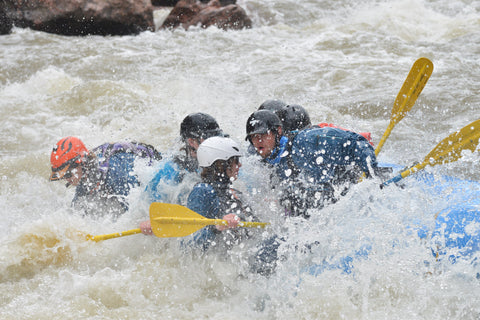
1. Get on the River!
Days off are for boating. The more time you spend on the river, reading water, and trying new moves, the better guide you will become. Try R2ing, Inflatable kayaking, kayaking, or canoeing. Hell, take an Inflatable Unicorn down the river. Whatever it takes to get repetitions in.
More than just getting on the river, try new things! When you don’t have guests, you can try the bigger line or the stickier surf. Mess around with new paddle commands, guide strokes, or guiding from the other side, and things will start clicking. Every trip, every different water level, is an opportunity to learn something new. So, just get on the river!
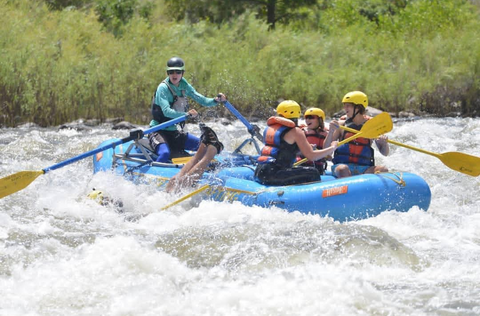
2. Hone Your Customer Service
Guiding whitewater rafting trips is 40% how you navigate the river and 60% guest interaction. So, learn how to do a song and dance for your guests. This includes reading the room (boat), understanding what kind of trip your guests want, making them feel comfortable, and steering the conversation away from controversial topics. (Politics, sex, and religion.)
Remember, this is their whitewater rafting trip, not yours. Avoid talking about yourself and focus on getting to know your guests. Listen to and learn everyone’s name, where they’re from, what else they’re doing on vacation, and how long they're in town. Customer service isn’t the highlight of the job, but the better you are at it, the more tip money you’ll make.
3. Paddle for Other Guides
Every guide has their spiel, stories, and jokes to keep the guest listening and engaged. Likewise, each guide moves the raft and runs the rapids slightly differently. In other words, riding along is invaluable. During raft guide training, ride-alongs are required, but even after the guide training process, use free trips to learn from other river guides.
Watch and listen to how senior guides share information, cater to the guests, and get them to paddle together. You might pick up a new trick for reassuring scared customers or discover a polite way to put someone in their place. Take what you like from other guides and make it your own.
4. Confidence is Key
To get guests to listen and paddle together, they have to trust you. And confidence is key! Paddle commands are just that, commands. You are in charge of your raft. Even if you don’t feel it, fake it ‘til you make it. Make eye contact with your guests, stand tall, and project your voice.
You might be backward, off-line, and hitting rocks, but act confident, and your guests will think you’re doing it on purpose. You know more than your customers, even on your first few trips. Answer their questions with authority, and if you don’t have an answer, make something up.
5. Stay Calm
This goes hand-in-hand with being confident. Stay calm (outwardly, at least) no matter what is happening around you. Even if Grandma falls out or the river guide in front of you flips, keep it together. Keep your voice level and your guests under control. They are looking to you; if you seem calm and collected, they won’t panic.
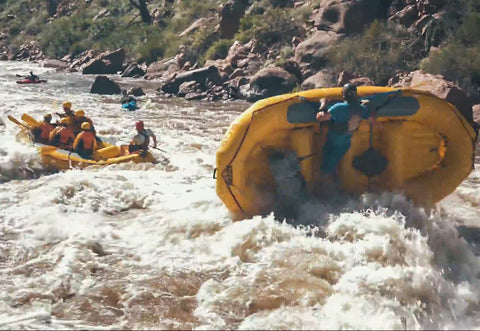
6. Read the Water
This sounds obvious. But first-year raft guides focus on the obstacles rather than the water. Look where you want to go, not where you don’t want to go. This means focusing on the water, not the rocks.
Reading water is a skill that can take you to any river in the world. Learn how to read the water instead of just memorizing lines. Reading water takes time and practice. Scout rapids from shore, study the river on every lap, and take advantage of any chance to see a new river or section.
7. Never Stop Steering
You are the raft guide; your paddle should always be in the water! Maybe you’re not doing much, but you’re doing more than you would with your paddle on your lap. Plus, you can react, correct, and regain control quicker if your paddle is already in the water.
If you’re paddling, you’ll have a much better chance of keeping up with the more experienced raft guides. Even awkward forward strokes are better than nothing. And you will master the different strokes in less time if you never stop steering.
8. Be Accountable
Things go wrong, people swim, and sometimes boats flip. It’s tempting to blame your crew, the boat in front of you, or even the wind. The truth is, it was almost definitely the raft guide’s fault. You won’t learn from your mistakes if you’re not accountable.
Use mess-ups as an opportunity to learn. Even fifteen+ year guides are still learning every day on the river. Figure out where you went wrong, how you could have anticipated a less-than-ideal crew, and what you can do better next time.
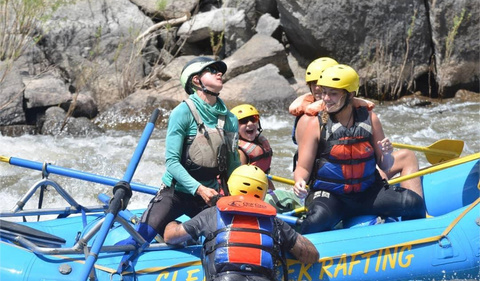
9. Don’t Be Discouraged
When things do go wrong, don’t be discouraged. The best guides have made the most mistakes. Hitting your lines every time is great. It’s the goal, but you don’t learn from clean runs. What happens doesn’t matter as much as how you react and clean up the situation. With this in mind, practice, practice, practice. Practice makes progress (perfect doesn’t exist in whitewater.)
Even after guide training is over, practice pulling yourself back into the raft, pulling others back in, and flipping your boat back over. Practice throw-bagging, swimming rapids, and high-siding. On fun runs, put yourself in unideal situations, and learn how to get out. For example, a surf you wouldn’t do with guests (nothing life-risking!)
10. Ignore the Egos
For the most part, the more experienced guides want to help you succeed and learn. However, we all know whitewater rafting guides with big egos who enjoy belittling the new guides. Ignore them! You don’t have to do anything you’re not comfortable with!
Be open to constructive feedback but don’t let anyone treat you poorly. This includes other guides, management, and even the person who signs your paycheck.
11. Check Your Ego
Just as important as ignoring the egos is making sure to leave yours at the door. It doesn’t matter how many times you’ve been whitewater rafting, which multi-day trips you’ve already done, or how many Class V rapids you’ve kayaked.
Even if you know how to move a raft, do you know how to calm a terrified guest, entertain young children, or help Grandma stay safe? Leave your ego at the door and come to whitewater rafting guide school with an open mind.
Luckily, the river always knows better. If you start getting too big for your britches, she will put you in your place. The best whitewater guides respect the river, the guests, and each other.
Most Importantly, Have Fun!
Why did you want to become a whitewater rafting guide? Because you knew it would be fun. And it is! It’s the most fun job we can think of. Most days, you’ll have to pinch yourself, asking, “Am I really getting paid for this?”
You get to work in a beautiful place and share it with others. It doesn’t get better than that. If this is your first season or one of many, Have fun, be safe, and say hi if you see us out there!
What’s your best advice for rookie guides or tips for rafting in general? Let us know in the comments, and don’t forget to share this with a raft guide rookie.
By: Megan McPartland



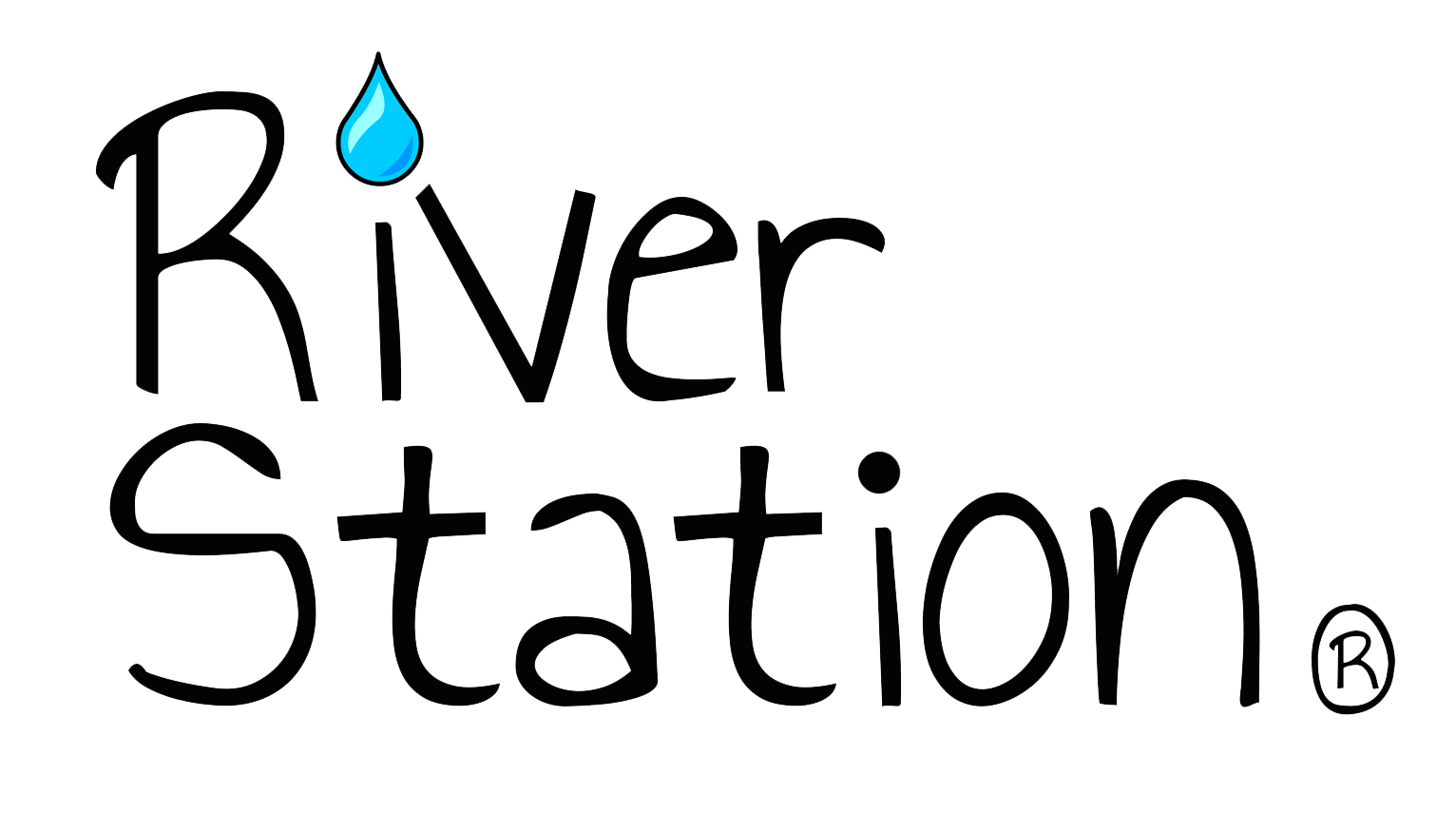
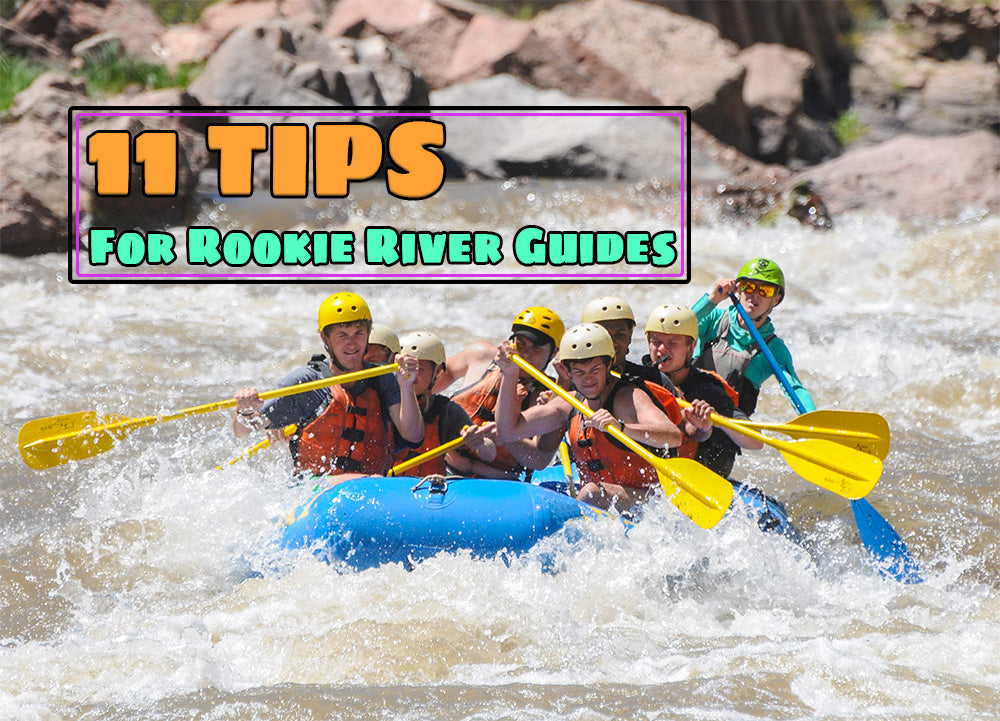
Share:
River Etiquette
5 Tips for Dealing With Stinky River Gear
1 comment
If you cannot talk and j-stroke at the same time, don’t talk.